- jasper/jay - 30s - he/him - about - hermes devotee white nationalists, tradfems, fascists, terfs Fuck Off hellenistic-ish polytheist main blog @bi-mirandalawson
Don't wanna be here? Send us removal request.
Text
Beat,
beat,
beat.
A pulse in the waters of Nun,
you rise like Tatenen,
O' Nit.
Mehit-Werit,
The Great Flood,
you light births the first mound,
and from your limbs come existence.
Dua Nit!
8 notes
·
View notes
Text
whenever i've been feeling distant from my practice, the solution is always to rearrange my altar.
3 notes
·
View notes
Text
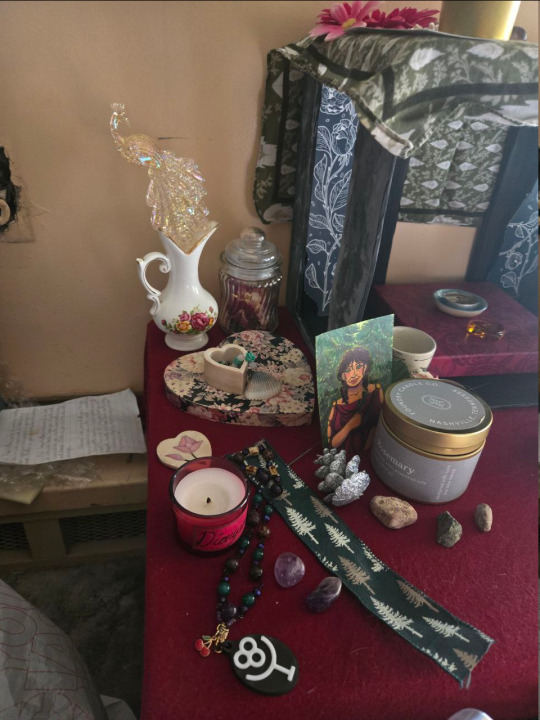
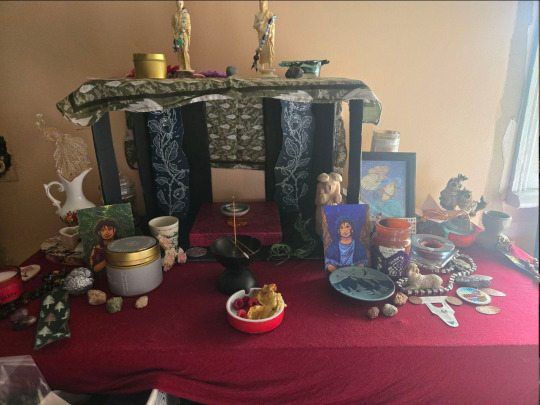
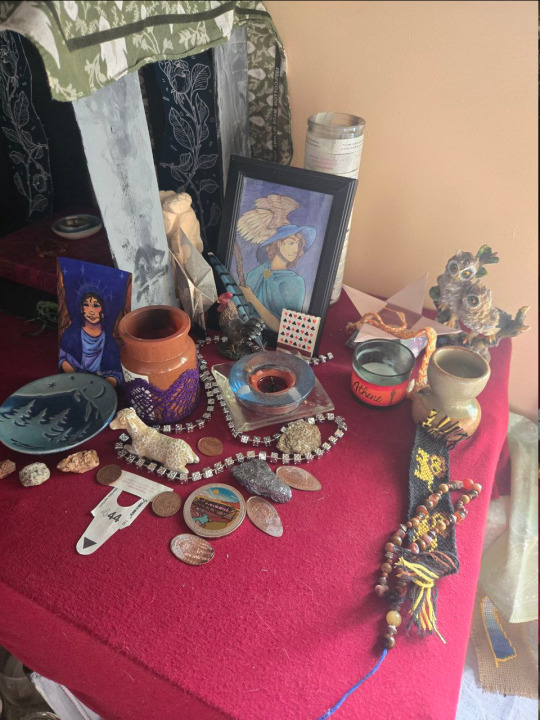
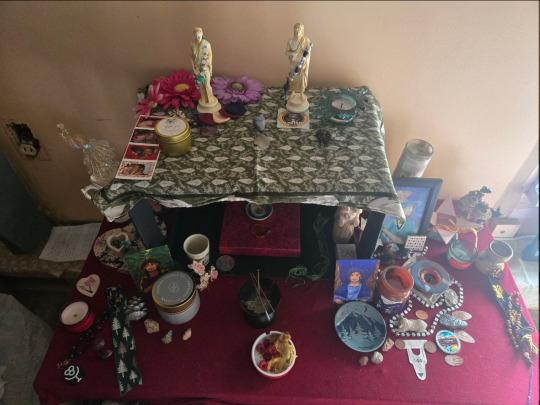
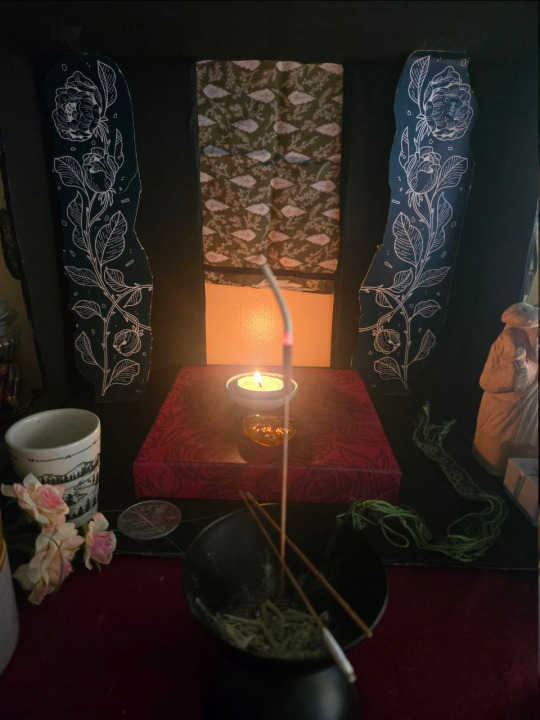
new altar set up !
i was feeling a little crowded and i wanted to start building vertically so i made this. thing. sort of lararium inspired, sort of temple inspired, sort of cave inspired. it's just a cardboard box that i cut holes in and painted.
it was done completely impulsively, after thinking for a while that i needed to buy a shelf but struggled with the feeling of always wanting to Buy Things for my practice. and then last night i was like. what if i just Made Something. it doesn't need to be super structurally strong, it's not gonna have more than zeus' and hera's statues and candles on it.
i made it out of stuff i already had around my house- the box was actually given to hold a big take out order lmao (i cut out the greasy parts) and the paint i've had forever. the flowers in the back are from a fancy box that an oracle deck was shipped in (that i bought years ago for my spouse and kept the box bc it was pretty but hadn't done anything with). i used painters tape to cover the rough cardboard edges before painting.
i knew i wanted to put hera and zeus on the shelf, bc they are king and queen and it feels right to elevate them. when i realized i was making something more enclosed than just a lil shelf, i had the idea of it being a mountain/cave. which extra meant that i wanted to put zeus and hera on top.
when i was done with it, it looked more temple-y to me. and of course i had to put hestia in it. in the center. i have something from most of my other deities in there, and i will have fun rearranging and moving things in and out of the 'temple'
wip before painting:

im gonna be rearranging stuff a lot as i get settled into this space, i haven't had anything like this before. and i'm really excited !
8 notes
·
View notes
Text
Dionysos is a fungal god whose body creeps underfoot. Connector of terrestrial plants, nourisher of the forest.
Hyphal Theos with hunger unmatched, consuming all Thanatos has claimed.
Upon Gaea's every face lies the fruiting Dionysos. Swelling, fertile God release your spores that embrace every surface
Within us They dwell, bring us to our knees They will. The cure for our pains lies within His grasp—alongside Asklepios does Their curiosity tread.
Hail to you, Dionysos of the Mycelium ! Gently do you deliver us back into the arms of the mother.
132 notes
·
View notes
Text

Dua Sutekh, mighty and powerful defender of the Solar Barque! Glory to You of the Loud Voice, who shakes the very heavens and reigns over the lands! Dua Sutekh!
Finally got over my perfectionism to finish this devotional piece! Hopefully the quality isn't atrocious lol. A special thank you to the Per-Maat server on discord, they were instrumental in finding resources to depict everything as accurately as possible!!
+10 points if u find my signature, im experimenting with different versions!! close-ups of Lord Sutekh, the corselet, and sha below the break!! my next post will just be the progress pics of this piece lol



once i figure out how to do prints i'll probably add this to my altar :3c
189 notes
·
View notes
Text
The Agathos Daimon and Why You Should Work With Him.
✨Important note!✨ There are many ways to practice Hellenismos, this post contains my suggestions based on my own research and personal experiences. I am in no way suggesting that my way is the only correct way. Khaire!
——————————————————
So just who exactly is the Agathos Daimon anyways?
Agathos Daimon translates to “good spirit” or “spirit of abundant goodness.” He is also known as the agathodaemon.
He is most often depicted as a snake, or as a young man holding a cornucopia of abundance.

According to Hellenion.org:
“A good spirit usually refers to a type of divine being that is less powerful than a God, is personal to each family, and can bring the family good luck, protection, or some type of assistance… was thought to be an aspect of Zeus, as Zeus Ktesios, Charitodotes, and Epikarpios, titles as giver of increase and joy…” (1)
The first time I encountered the term Agathos Daimon was in Hellenismos by Tony Mierzwicki, an excellent book that focuses on building kharis through ritual:
“[Agathos Daimôn]: the only daimon to be venerated universally. He was represented as a snake and protected houses. The first libation in wine drinking was offered to him. (The Greeks normally diluted their wine with water.) He also received small libations of unmixed wine after meals.” (2)
Tony encourages practitioners to offer a small libation of whatever they’re drinking with dinner after the meal. The Agathos Daimon is also honored on the second waxing (lunar day) of each month in the Attic calendar. I tried offering those libations, but I often forgot—because I didn’t really understand why. I knew he was a household spirit, but what exactly made him the good spirit?
That clarity came for me while reading Kharis by Sarah Kate Istra Winter. I highly recommend it. She writes:
“One of the most important concepts in Greek religion is the Agathos Daimon,” and that traditionally, “the Agathos Daimon seems to exist on a more individual level than the rites of the gods or even heroes.” (3)
Sarah compares him to a guardian angel, “attached to a person at birth to protect and guide them throughout life” (3). As someone raised Christian, that clicked for me.
The Agathos Daimon is the guardian spirit of your oikos—your home, family, and you personally.
——————————————————
Okay, but why should I work with him?
Besides being your guide and protector, the Agathos Daimon is always with you. Unlike the gods, who have many responsibilities and other worshipers, your Agathos Daimon is present in your everyday life.
“If there is something in particular that your family wishes help with, give an additional offering to your family’s protective spirit.” (1)
He’s also considered a source of good luck, and cultivating a relationship with him can invite more fortune into your home.
Today, I got a reminder of that. During a tarot reading, he strongly encouraged me to “use my voice.” I’d recently seen a very traumatic movie, and I decided to post a review to warn others. Right after uploading it, I got invited to Amazon Vine—something I’ve wanted for years.
One of my favorite reasons to work with your Agathos Daimon is for daily guidance:
“When you need guidance, you might turn first to it before asking the gods. Your Agathos Daimon can be an invaluable teacher, protector, and guide…” (3)
I had always struggled with divination—tarot, pendulums, etc. As a worshiper of Apollon, I love practicing divination in his name. But I don’t believe the gods always answer every time I reach out. They have full lives and other people to tend to. I also didn’t trust my own skill at tarot enough to know whether I was getting a response from a god… or just wishful thinking.
That led to confusing readings, a pendulum that never settled, and more questions than answers. But once I understood that I could speak with my own guiding spirit, everything changed.
A personal example:
The first 3-card reading I did specifically asking the Agathos Daimon for help was the clearest reading I’ve ever had.
Previously, I would question every card. But in that reading, I understood the message right away: I was the one holding myself back. If I wanted to move forward, I needed to let go of fear and take the step. Simple, direct, and empowering.
Now, I pull a single card most mornings and ask him for a focus for the day.
On a busy day, I drew the Knight of Pentacles—encouraging me to buckle down and stay steady.
On a quiet day, I drew the Queen of Cups—a gentle nudge to rest, nurture myself, and check in on my husband emotionally.


It’s night and day compared to before. Divination is now clearer, and still devotional to Apollon—but with the help of my good spirit.
Knowing your Agathos Daimon’s “voice” also helps you recognize when you’re speaking to someone else… and if you have the honor of a god joining your table.
Another important reason to work with him is that he serves as a bridge between you and the gods.
“Although we know we can always approach the Gods directly, the Agathoi Daimones are seen to be helpful intermediaries between the Gods and man.” (1)
“The daimones stand between gods and men… interpreters and ferrymen.” — Plato (3)
“The great mind of Zeus steers the daimon of the men whom he loves.” — Pindar (3)
He’s perfect for those small questions—the kind that might feel too trivial to ask a god.
Some questions I’ve asked recently:
“I can’t find anything to open this Amazon box—would it be disrespectful to use the small knife I gave Ares?”
“I feel like Dionysos has been offering signs—am I interpreting that right?”
“I want to abstain from intercourse on the 6th waxing to honor Artemis’ choice of virginity. Would she consider that respectful or shallow?”
You can always ask the community (Tumblr, Discord, etc.), but don’t forget that your Agathos Daimon can give you answers directly.
Another personal example:
I tried to ask Ares that first question. The pendulum started spinning the moment I picked it up.
Me: “Ares, can I ask you something quickly?”
Ares: “No.”
Me: “Oh, are you busy?”
Ares: “Yes.”
And that was that. I thanked him for responding and moved on.
Then I turned to my Agathos Daimon for the other two questions. Before I started I confirmed:
Spinning = yes
Side-to-side = no
Back-and-forth = ask tarot
After, the pendulum was still until I asked my questions:
Me: “Dionysos has been offering signs—is that right?”
Agathos Daimon: enthusiastic spinning
Me: “Thanks.”
AD: stills
Me: “Would Artemis consider abstaining on the 6th waxing a respectful offering?”
AD: enthusiastic spinning
Me: “Thank you.”
AD: stills
“[M]any Hellenic polytheists largely ignore daimones in general, and few acknowledge their own Agathos Daimon. I think adopting this ancient tradition will add something to our religion. I think it will encourage the possibility of intimate spiritual relationships with divine entities, and even bring us closer to the gods. I also see it as an opportunity to integrate our practice with the world in which we live. The actual spirit who belongs to you (and to whom you belong) will probably be tied to your family, and/ or the land around you, and relating to it in the context of Greek religious practice brings our religion fully into the present time and place.” (3)
——————————————————
How do I start building a relationship with him?
Luckily, since he’s always around, it’s not hard to start building kharis with him.
Offer a libation of the last of your drink after dinner.
Pour it outside, into a potted plant, or into a special bowl or vessel. I use a pot of dirt that I plan to decorate with snake imagery. I also pour water into houseplants.
Pray or dedicate the offering aloud. Even a simple “This is for you, Agathos Daimon” before pouring is enough.
“Without the prayer or dedication, a libation is nothing but spillage.” (3)
• Honor him on the second day of the month.
If you use the Attic calendar, that’s the second day of the lunar month. Otherwise, the 2nd of the Gregorian month is fine.
“You can begin a relationship by saving out the second day of the month, offering libations, and trying to get a feel for him.” (3)
He doesn’t have his own Orphic Hymn, but both Hellenismos and Kharis suggest Hymn 72, to Zeus (as the Daimons).
The Fumigation from Frankincense.
Thee, mighty-ruling, Dæmon dread, I call, mild Zeus, life-giving, and the source of all:
Great Zeus, much-wand'ring, terrible and strong, to whom revenge and tortures dire belong.
Mankind from thee, in plenteous wealth abound, when in their dwellings joyful thou art found;
Or pass thro' life afflicted and distress'd, the needful means of bliss by thee supprest.
'Tis thine alone endu'd with boundless might, to keep the keys of sorrow and delight.
O holy, blessed father, hear my pray'r, disperse the seeds of life-consuming care;
With fav'ring mind the sacred rites attend, and grant my days a glorious, blessed end. (4)
You can also always write your own prayers and hymns should you feel so compelled.
The Agathos Daimon is also a source of luck. If you experience extraordinary good fortune, show gratitude with a small offering. I keep little bottles of wine on hand for this. I’ve also given him a banded agate—a calm, balanced stone I thought he’d enjoy.
——————————————————
Thanks for reading! Khaire!
——————————————————
Resources
(1) Hellenion
(2) Hellenismos by Tony Mierzwicki
(3) Kharis by Sarah Kate Istra Winter
(4) Theoi Classical Texts Library
Hellenic Herald <- awesome Discord group
Pictured Tarot deck
#agathos daimon#i love the perspective of it as a guardian angel.#a little bit of divinity assigned just to you <3#helpol
8 notes
·
View notes
Text
English & Español
Mother Hestia
Mother Hestia is the one who cleans my wounds when I get out of misery.
It is her who clothes me in soft fabrics and reminds me what love is like.
It is her who caresses my hair, healing my pain without needing to ask.
Mother Hestia is the one in my kitchen when I make my food.
It is her who chops, cleans and seasons.
It is her who mixes the condiments with the patience of one who creates perfection through love.
Mother Hestia is the one who keeps us together.
It is her who disarms our defenses and reminds us what it is to hear.
It is her who embraces and helps us remember we are all siblings.
Mother Hestia is the founder of family and home.
No matter how much me may fail or hate, she will always be there for us,
For when we want to get back to her warm arms and feel her soul within ours.
Madre Hestia
Madre Hestia es quien cuida mis heridas al volver de la miseria.
Es ella quien me arropa en suaves telas y me recuerda lo que es el amor.
Es ella quien me acaricia los cabellos mientras sana mis penas sin pedir permiso.
Madre Hestia es quien está en mi cocina cuando creo mi alimento.
Es ella quien corta, limpia y sazona.
Es ella quien mezcla los condimentos con la paciencia de quien crea perfección mediante amor.
Madre Hestia es quien nos mantiene unidos.
Es ella quien desarma nuestras defensas y nos recuerda lo que es escuchar.
Es ella quien nos abraza y ayuda a recordar que somos hermanos
Madre Hestia es la creadora de la familia y el hogar.
No importa cuánto podamos fallar u odiar, ella siempre estará allí para nosotros,
Para cuando queramos volver a sus brazos cálidos y sentir su alma con la nuestra.
2 notes
·
View notes
Text

Lord Hypnos 🤍💙🩵
#oh this is gorgeous !!#your colors are so nice. even the really bright pinks are like. muted and soft.#hypnos#art
44 notes
·
View notes
Text
Pagans before you get into the habit of trashing "Abrahamic religions" I suggest you pause and consider the following:
Are you meaning Christianity
Are you thinking evangelicalism in the United States
Are you about to be antisemitic and/or Islamophobic
Are you looking at pagan and polytheistic religions with rose colored glasses on
Are you basing your opinions solely on your personal biases coming from your own religious and/or cultural Christian upbringing and environment
777 notes
·
View notes
Text


Baby Steps...
1K notes
·
View notes
Text
unexpected epithets of artemis: artemis kordaka
from what i've read, pausinias is our ancient source for artemis kordaka:
"... a surname of artemis in elis, derived from an indecent dance called ko/rdac, which the companions of pelops are said to have performed in honour of the goddess after a victory which they had won." (source: william smith's dictionary...)
according to this source (george mason university), the epithet was connected to artemis for an important reason:
"the dance of greek comedy - kordax - begins in the cult of artemis."
artemis kordaka is our primary instance of "indecent dancing" being performed in artemis' honor, but it is not the only one:
"... indecent dancing as part of ritual behavior is attested in a number of cults of artemis, especially in that of artemis kordaka in elis." (from "becoming classical artemis..." by olga albert zolotnikova)
more on the dance, which i've seen spelled a few ways in english, mainly kordax or cordax. this was a dance that was performed during greek comedies:
"the licentious dance of the ancient greek comedy. to perform it off the stage was regarded as a sign of intoxication or profligacy." (source: penn)
"in greek comedies, they danced the very popular kordax, a mask dance of uninhibited lasciviousness." (source: britannica)
"the cordax (ancient greek: κόρδαξ), was a provocative, licentious, and often obscene mask dance of ancient greek comedy. in his play the clouds, aristophanes complains that other playwrights of his time try to hide the feebleness of their plays by bringing an old woman onto the stage to dance the cordax." (source: LSJ)
"upon a foundation of very old fertility schemata such as violent whirling, stamping, kicking, leaping, swaying of the hips, and shaking of the fleshy parts of the body - schemata common to fertility dances among peoples in all parts of the world and in all epochs and attested for the greek kordax." (source: by lillian b. lawler)
according to that last source, artemis was sometimes worshipped as a partial fish deity, and this dance could have been viewed as a "fish dance".
there is an interesting feature to these dances that i must note, although i am not sure if this is part of the ritualized dancin or only in its comedic forms:
"these dances were performed by men, sometimes dressed in womens clothing. when danced by women, they used to wear phalluses in front of them." (source: phallephoria)
"aristophanes also mentions two other features which link the ' vulgar comedy ' to the peloponnesian mime — the kordax andt he leathern phallus worn by the actors... the dance itself is linked with the peloponnesian cult of artemis, the ancient goddess of fertility." (source: the origin of attic comedy)
the faux phalluses could be a reference to her role as a fertility deity and the dance as a celebration of fertility. there is an interesting element of gender-nonconformity as well.
artemis was not the only olympian deity to be worshipped through the kordaka:
[lucian] considers that... [the] kordaka were parts of dionysian or bacchanal ceremonies. (source: panr journal)
from these pieces of information, i can make a few inferences
the kordaka symbolized letting go of all internal restraints. letting go of structure, letting yourself be free. this kind of transcendental ecstasy, achieved through dance, is tied to artemis - through this epithet and other aspects of hers - and even more obviously to dionysos.
the kordaka was one of several "indecent" dances performed in the name of artemis, to honor her uninhibited spirit. there is reason to believe this particular "indecent" dance originated at the sites of her worship.
the kordaka was also performed to 'celebrate victory', which relates to artemis' more bloodthirsty nature.
finally, this dance potentially has a connection to her role as a goddess of fertility, an earlier role of artemis that became less prominent as she was worshipped as a virgin.
3 notes
·
View notes
Text
im in the middle.
i dont think most people will ever 'hear' the gods. i don't think communication from/with the gods usually comes in full sentences or like a conversation between two people. i dont think most people will be given a lot of very clear messages, and communication will usually require interpretation and discernment.
i do believe that anyone can communicate with the gods. i do believe that by learning divination, anyone can receive messages from the gods at any time. i dont think you need special training, but you do need to learn your preferred system of div, and hone your intuition.
i do consider some kinds of divination to be more reliable than others. the larger the margin for human influence, the less reliable i consider it to be.
i think that the larger the scale of your query, the more involved the process should be. asking for guidance for just yourself, nothing special has to be done. looking for guidance for a whole community, i think would require a more ritualized approach.
do people nowadays really "hear" the gods? discussion wanted
hey fellas, title is really vague but let me explain. i really love to overthink a lot of pagan stuff, and one thing that's been bouncing around in my head recently has been about how there are basically two camps in modern polytheistic circles regarding communicating with the gods/divine/etc:
historic reconstructionism camp - only highly trained people (i.e. priests, oracles, etc) can "hear"/communicate in general with the gods. people in ancient antiquity did not receive regular signs, visions, or other types of communication from the gods, and to believe otherwise is unrealistic and hubristic. the gods have no reason to communicate with the average person. methods of communication are intricate, intense and often ritualistic, like reading the entrails of animals - modern divination present in new age movements like pendulum, tarot and shufflemancy is not the same as this.
"things change" camp - anyone can communicate with the gods, though many different methods - including modern divination methods, which are often more accessible than ancient methods. you do not need to have special training to "hear"/communicate with the gods. all are of equal importance to the divine, and they will speak with and love anyone who offers to them attention and devotion. it is entirely reasonable to think the gods "talk" to you through thoughts that are not your own, signs in the every day, etc. the gods are omnipotent and omnipresent, and so have more than enough ability to answer when called.
so i'd really like to know where you guys fall in this camp, or any insight/opinions y'all might have on the subject. no fighting, please, only civil discussion.
for the record, here's my stance:
i think anyone *can* receive messages from the gods, but there are many different levels to this. every mental "message" that comes to my head doesn't *have* to be a god speaking directly to me, but on the other hand, i would be denying their seemingly limitless power if i said i didn't think they had the ability to insert suggestions into my subconscious. this is factoring in discernment, of course, which i do think a lot of people are lacking in a lot of pagan circles nowadays, and i myself am certainly not exempt from! which is where the idea of priests and oracles being trained to "hear" the gods better and more clearly makes sense to me, but still ... the idea of only a limited group of people being able to communicate with the gods doesn't sit right with me, particularly because i can easily frame it as being put in place by those in power to keep the average person from listening too intently to their own subconsciousness/"messages"/signs or what-have-you and speaking against messages that were given by trained speakers designated by the ruling class of society.
on that note, the term "spiritual psychosis" does get thrown around WAY too much nowadays when people bring up their own experiences with the gods. certainly mental health plays a part of it, and realistically none of us are the designated godphone/demigod hero of legend - but have people also, in the past, not been given credence when they received "messages" (i.e. thoughts, signs, etc) from the gods, and simply pushed them aside because only the trained professionals can "hear" the gods? was it simply that they were coming at it from a different mindset, and just genuinely thought of things differently than we do today, particularly as we have the benefit of being (in a decent percentage of cases) less burdened with everyday survival ala not starving, being attacked by wild animals, killed by a rival kingdom invasion etc due to society changing? or are we just wanting to be special, today in a world where we all feel so small and overwhelmed by everything and craving love from something bigger than ourselves?
thanks for reading if you do, i'd really genuinely like to hear from folks on this.
80 notes
·
View notes
Text

Celebrating Apollo early with this tattoo piece I designed for him 💛 it’s a bouquet of plants that are sacred to him or that I associate with him. From left to right there’s hyacinth, laurel leaves, and sunflower.
If you’re interested in this piece, dm me! I’m selling this for $15
6 notes
·
View notes
Text
do people nowadays really "hear" the gods? discussion wanted
hey fellas, title is really vague but let me explain. i really love to overthink a lot of pagan stuff, and one thing that's been bouncing around in my head recently has been about how there are basically two camps in modern polytheistic circles regarding communicating with the gods/divine/etc:
historic reconstructionism camp - only highly trained people (i.e. priests, oracles, etc) can "hear"/communicate in general with the gods. people in ancient antiquity did not receive regular signs, visions, or other types of communication from the gods, and to believe otherwise is unrealistic and hubristic. the gods have no reason to communicate with the average person. methods of communication are intricate, intense and often ritualistic, like reading the entrails of animals - modern divination present in new age movements like pendulum, tarot and shufflemancy is not the same as this.
"things change" camp - anyone can communicate with the gods, though many different methods - including modern divination methods, which are often more accessible than ancient methods. you do not need to have special training to "hear"/communicate with the gods. all are of equal importance to the divine, and they will speak with and love anyone who offers to them attention and devotion. it is entirely reasonable to think the gods "talk" to you through thoughts that are not your own, signs in the every day, etc. the gods are omnipotent and omnipresent, and so have more than enough ability to answer when called.
so i'd really like to know where you guys fall in this camp, or any insight/opinions y'all might have on the subject. no fighting, please, only civil discussion.
for the record, here's my stance:
i think anyone *can* receive messages from the gods, but there are many different levels to this. every mental "message" that comes to my head doesn't *have* to be a god speaking directly to me, but on the other hand, i would be denying their seemingly limitless power if i said i didn't think they had the ability to insert suggestions into my subconscious. this is factoring in discernment, of course, which i do think a lot of people are lacking in a lot of pagan circles nowadays, and i myself am certainly not exempt from! which is where the idea of priests and oracles being trained to "hear" the gods better and more clearly makes sense to me, but still ... the idea of only a limited group of people being able to communicate with the gods doesn't sit right with me, particularly because i can easily frame it as being put in place by those in power to keep the average person from listening too intently to their own subconsciousness/"messages"/signs or what-have-you and speaking against messages that were given by trained speakers designated by the ruling class of society.
on that note, the term "spiritual psychosis" does get thrown around WAY too much nowadays when people bring up their own experiences with the gods. certainly mental health plays a part of it, and realistically none of us are the designated godphone/demigod hero of legend - but have people also, in the past, not been given credence when they received "messages" (i.e. thoughts, signs, etc) from the gods, and simply pushed them aside because only the trained professionals can "hear" the gods? was it simply that they were coming at it from a different mindset, and just genuinely thought of things differently than we do today, particularly as we have the benefit of being (in a decent percentage of cases) less burdened with everyday survival ala not starving, being attacked by wild animals, killed by a rival kingdom invasion etc due to society changing? or are we just wanting to be special, today in a world where we all feel so small and overwhelmed by everything and craving love from something bigger than ourselves?
thanks for reading if you do, i'd really genuinely like to hear from folks on this.
#reblogging so that i remember to make an actual response tomorrow#the tl;dr is that im somewhere in the middle
80 notes
·
View notes
Text

Here she is, all revamped
I love her!!
Made by me
If you want any devotional art come in my dms it's always open
44 notes
·
View notes
Note
Just a small help, the Ancient Greek word for hearth IS Hestia. Same as Thanatos meaning death, Hypnos means sleep and Nyx means night etc. - so Honor Hestia and Honor the Hearth is 100% the same.
Ohhh okay, see I suspected that because Ouranos means sky, Selene is moon, Tyche means luck and so on but the name of the Olympian Gods tended to not be the literal name of what they were the God of.
281 notes
·
View notes
